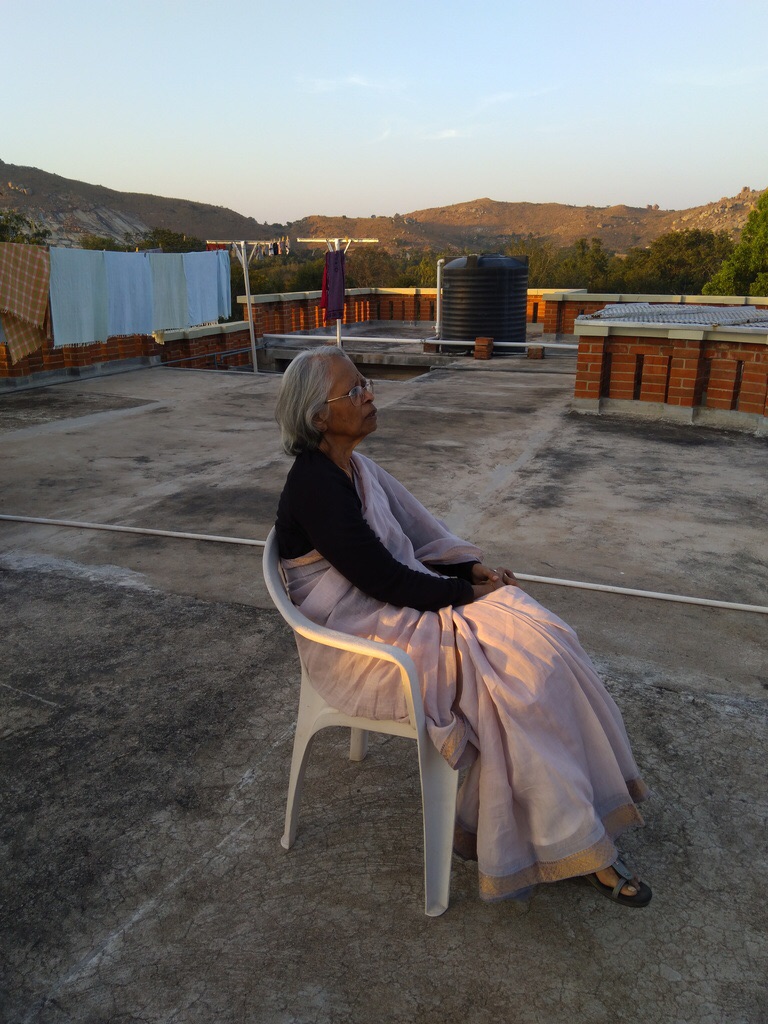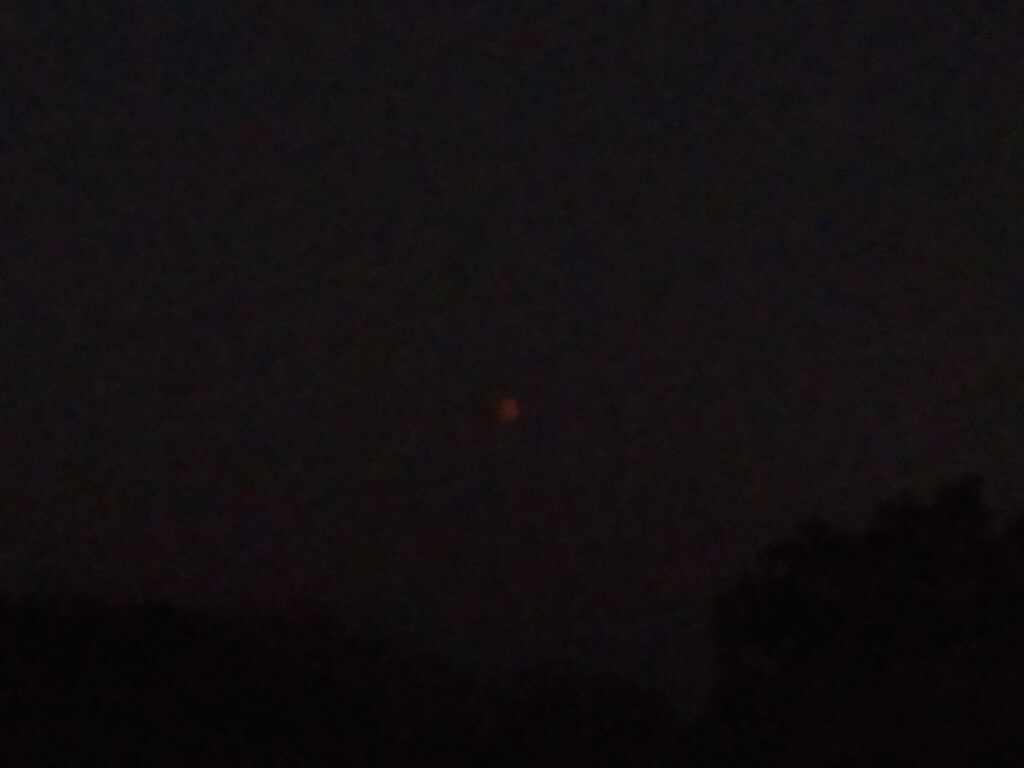January 31, 2018
Hyderabad
The floor is freezing when I get out of bed. My son and mother are still asleep, but I wake up because there’s a chilly breeze coming through the window. It can’t be six yet, but in a few minutes, Gopal, the caretaker of the school guest house, will arrive with a flask of coffee and the day will begin.
My mother and I arrived this time yesterday, at the same unexpectedly cold crack of dawn. As we stood at the end of the platform, looking for the vehicle sent by my son’s school, a large yellow moon was pinned onto the sky above us. The school is in a small valley a few kilometers outside the town where Tagore wrote a draft of India’s national anthem; when the car came, we drove past tiny villages and ancient granite formations, following that yellow disc and smelling the green air. When we arrived and unfolded ourselves from the car, the sky had begun to brighten and the moon was nowhere to be seen.
We’ll see it tonight, though; we’ve come to a good place to see the eclipse of the moon that, by a series of celestial coincidences, is “blue” and “super” and “blood.”
After breakfast, after assembly when the children sit cross-legged and the adults take the benches if they can’t, and sing together, and in the silence that follows, filled only with birdsong, during which surprisingly few children are restless; when classes begin and my mother and I hunt for likely cuttings and seeds to pinch the next day before it’s time to return; in the post-lunch lull of the deep afternoon when it doesn’t seem like the sky can ever hold anything as cold as a bright, full moon that will turn a sinister red: later, I will think of how words get used in popular science.
Take super: It is an inadequate word. I hear it as sooper! used to describe a new restaurant or a movie. Although, yes, a lunar eclipse is a sooper thing to be able to watch, when I hear the word, I really don’t think of size. Blue because rare, because once in a blue moon, whatever that means; blue like cheese, well-aged, maybe? Or like a steak that’s blue because it’s so rare it’s bleeding. Blood is the only adjective that makes sense. I can’t remember the last total lunar eclipse I saw, but going by the yellow-orange of the uneclipsed and nearly full moon over the station yesterday, I can see how it would dim into a baleful red.
It’s later in the day. A knock on the door wakes my mother from a surprisingly deep sleep; it’s my son back from classes with a lot to say and show. In a matter of weeks he will be done with this school where he has lived for six years; his final exams are nearly upon him, so most of his talk is . . . If you were guessing studying or tests, you’d be wrong; most of his talk is about who is applying to which college, what their chances are, where they’d like to be and what they’d like to do. There are so many months of entrance tests and anxiety ahead of them.
But my son looks cheerful enough. He brings out his masterpiece, the cat he has been carving since his last vacation. It’s done now, polished a deep brown with warm coconut oil and beeswax. She is beautiful: poised and alert, but with mysterious hollows for eyes. “It’s done by leaving out things, not showing too much,” my son explains.

My mother plainly covets it. I do too, though I don’t say it because he’s already given it to a friend. My mother tries to persuade him. “I can’t, Pati,” he replies. “I have someone in mind when I begin to make a thing and I can’t just give it to someone else.” I kind of understand. I give the cat back, after taking them both upstairs where the light is and taking several photographs. He puts her back carefully into a box that had once contained tea but now has been repurposed into a jewel box lined with cotton.
Kids in boarding school are always starving, so we’ve brought him so much to eat: cheese, olives, grapes, strawberries, ber, and biscuits with Nutella. All day he snacks, and what’s left will be shared with his roommates (though they’d prefer large quantities of Maggi, which they will cook in secret in the most disgusting ways).
Later, we go for a walk. We talk all about the coming eclipse, which will be visible at 6:30. That’s prep time, and for the first time in his six years, my son is determined to bunk prep. We bump into two of his classmates, and he has a brief conversation with them that ends with exclamations of surprise and claps on the back. We’ll be watching the eclipse while they sit under white lights, the poor saps. They will tell their prep supervisor that my son has a headache.
On the guest house terrace, there are clothes on a washing line, but they’re off to one side. Pipes crisscross the floor, and we tread carefully because we know they won’t be visible once it gets dark. I bring up a chair for my mother. We’ve forgotten the mosquito repellent, but we don’t really care.
The sun sets behind the three hills to the west; this is familiar stuff so we turn our backs to it to search the sky in the east. My son says the moon will appear behind the hill that looks over the football field, called “Cave Rock.” Under a gigantic monolith of granite, midway up the hill, there is a narrow cave that my son explored once, back when he was a slip of a boy.
It gets darker. I see a star and wish upon it; when we spot another, we release the wish. In a matter of moments, there’s a third . . . and then there, where that star appears, is the moon! It’s a good distance away from where my son assured us it would be, but there it is. There’s still too much light in the sky for it to be more than a translucent version of itself, but even so, the eclipse has already reached a point where the moon’s face is nearly covered.
The dark falls suddenly. We can see Orion, Auriga in Capella, Taurus, the Pleiades. This is what it is to stand under a full moon at the moment of total eclipse: the sky is prickled with the stars that would otherwise fade into invisibility.
When the lights around the guest house come on, we resent it deeply. This used to be a place where people carried torches in the evening, but security is a word they have allowed in, so now there are solar-powered streetlights. More light pollution than this valley is used to.
There are voices behind us. They are speaking in Tamil. My mother responds to the Tamil instantly, calling out to them to join us, and my son hisses at her to shut up; it is the principal’s secretary and her husband. If they see my son, they will realize he’s skipping prep.
They peer into the dark, but they can’t really make out who we are, or that there’s a student on the terrace. My son is still tense and muttering; there is no need for the drama, but he doesn’t agree, and it occupies his mind for some time. But they go away, and we have the terrace to ourselves.
I think about fear and consequences. I wonder why yet another evening of prep, a routine, is too important to be interrupted by something as rare and unusual as this eclipse. Some of the teachers supervising won’t be alive for another such event. The students worrying about where they’ll be by the end of summer will probably have children of their own when the next super blood blue moon comes along. They could have just cancelled prep. They could have let the school out to the football field to watch what has now, unmistakably, become a blood-red moon, with a black edge around the red.
“If you stare at a full moon like you shouldn’t at the sun, it will begin to pulse at you,” I said. We sat and stared at it. “Is it getting a bit light at the top right?” my son asked. My mother couldn’t see it. In fact, she was getting restless and announced that she needed to go back to the room.
She should have stayed. A thin sliver of gold appeared; the dinner bell went, and the moon emerged some more. As we walked to the dining hall, we saw people in pairs or small groups, huddled at odd spots along the way, their eyes on the sky. By the time we finished dinner, there was only one tiny edge of the moon still eclipsed. Outside, some of my son’s classmates were climbing down from the roof, having got permission to eat their dinner outside and having interpreted that permission generously. If teachers spotted them, they said nothing.
The stars had disappeared by the time we returned to our room. The moon was less golden and more silver, high in the sky. But we’d been mesmerized enough. We went upstairs one last time, but merely to say “goodnight moon” before we went to bed.






